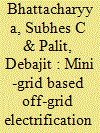|
|
|
Sort Order |
|
|
|
Items / Page
|
|
|
|
|
|
|
| Srl | Item |
| 1 |
ID:
177486


|
|
|
|
|
| Summary/Abstract |
Sub-Saharan Africa faces several challenges that hamper the effort to provide universal electricity access. The challenges are not the result of lack of energy resources but rather the result of governance and institutional problems as well as lack of capital to meet the high investment requirement. This study aims to provide relevant policy recommendations to facilitate the path towards universal electricity access in Sub-Saharan Africa. We do this by identifying the barriers for electricity access and the relevant actors, institutions, and regulations using desk research, stakeholder interviews and expert workshops. The results show that the absence of overall plans and approaches and lack of clarity in policies are the main challenges for the sector. Setting standards for electricity products, such as solar panels, could help to reduce the problem of counterfeit poor quality products. A broader participation of non-governmental actors is needed to increase the speed of electrification. This requires innovative revenue schemes, financial and fiscal incentives and elimination of market distortions. More generally, we conclude that stable and consistent policy frameworks and improved coordination between actors, are crucial to accelerate electrification in the region.
|
|
|
|
|
|
|
|
|
|
|
|
|
|
|
|
| 2 |
ID:
174983


|
|
|
|
|
| Summary/Abstract |
Globally, there is now a substantial decrease in unelectrified households. This unidimensional measure, however, fails to convey the level of electricity access enjoyed by these households, with electricity poverty (EP) still considered prevalent. The multi-faceted nature of EP is already recognised with several multidimensional indices proposed that are still oriented towards the binary approach of either having or not having access to certain attributes. This paper presents the Household Electricity Poverty Matrix (HEPM), a practical tool that assigns tier levels to household electricity access attributes. In this study, EP is measured in three Philippine islands and an aggregated index is compared with that of the Multidimensional Energy Poverty Index (MEPI) approach. Results suggest that Gilutongan and Pangan-an, both having less than 24-h electricity access, experience high EP incidence while Cobrador Island, with 24-h access, has relatively lower EP incidence. MEPI, on the other hand, classifies Gilutongan and Cobrador as having low incidence and Pangan-an as having moderate EP incidence. This work demonstrates that HEPM is a better approach to realistically assess community electrification and can serve as a good basis in enhancing electrical energy policy towards closing the electricity access gap and providing its socio-economic relevance to the target communities.
|
|
|
|
|
|
|
|
|
|
|
|
|
|
|
|
| 3 |
ID:
150754


|
|
|
|
|
| Summary/Abstract |
High demand for photovoltaic (PV), battery, and small-scale combined heat and power (CHP) technologies are driving a virtuous cycle of technological improvements and cost reductions in off-grid electric systems that increasingly compete with the grid market. Using a case study in the Upper Peninsula of Michigan, this paper quantifies the economic viability of off-grid PV+battery+CHP adoption and evaluates potential implications for grid-based utility models. The analysis shows that already some households could save money by switching to a solar hybrid off-grid system in comparison to the effective electric rates they are currently paying. Across the region by 2020, 92% of seasonal households and ~75% of year-round households are projected to meet electricity demands with lower costs. Furthermore, ~65% of all Upper Peninsula single-family owner-occupied households will both meet grid parity and be able to afford the systems by 2020. The results imply that economic circumstances could spur a positive feedback loop whereby grid electricity prices continue to rise and increasing numbers of customers choose alternatives (sometimes referred to as a “utility death spiral”), particularly in areas with relatively high electric utility rates. Utility companies and policy makers must take the potential for grid defection seriously when evaluating energy supply strategies.
|
|
|
|
|
|
|
|
|
|
|
|
|
|
|
|
| 4 |
ID:
150658


|
|
|
|
|
| Summary/Abstract |
With 1.2 billion people still lacking electricity access by 2013, electricity access remains a major global challenge. Although mini-grid based electrification has received attention in recent times, their full exploitation requires policy support covering a range of areas. Distilling the experience from a five year research project, OASYS South Asia, this paper presents the summary of research findings and shares the experience from four demonstration activities. It suggests that cost-effective universal electricity service remains a challenge and reaching the universal electrification target by 2030 will remain a challenge for the less developed countries. The financial, organisational and governance weaknesses hinder successful implementation of projects in many countries. The paper then provides 10 policy recommendations to promote mini-grids as a complementary route to grid extension to promote electricity access for successful outcomes.
|
|
|
|
|
|
|
|
|
|
|
|
|
|
|
|
| 5 |
ID:
150356


|
|
|
|
|
| Summary/Abstract |
Off-grid technologies are increasingly being proposed as a way of ensuring cost efficient universal access to electricity in many developing countries. However, many un-electrified communities would prefer access to electricity via the national grid rather than off-grid technologies. Electricity planning based on cost efficiency alone could therefore be undermined by political pressure from discontented communities that are assigned off-grid technologies. Using a case study of un-electrified communities in Ghana, we develop an electricity planning algorithm based on hierarchical lexicographic programming and consider specifications where the priorities are adjusted to give weight to (1) cost efficiency and (2) political economy considerations so that communities with larger populations (and therefore votes) are given priority in terms of grid electrification. The results emphasise the need to incorporate the political economy considerations in the national planning of universal electrification, showing significant regional differences in terms of where grid extensions ought to be placed. Incorporating a political economy perspective in national planning also suggests that the most important policy trade-offs shift from considering the grid versus off-grid balance to focussing more on the effectiveness of grid investment in providing universal access.
|
|
|
|
|
|
|
|
|
|
|
|
|
|
|
|
| 6 |
ID:
166493


|
|
|
|
|
| Summary/Abstract |
In Australia, as elsewhere, household electricity infrastructure is changing: over one-fifth of Australian households have rooftop solar photovoltaics (PV), and there is growing opportunity to purchase household battery storage. Australia has the highest proportion of distributed (household-level) solar PV worldwide. There is, however, concern from Australian utilities and governments that increasing numbers of households will opt to leave the centralised electricity grid, as it becomes technically feasible and cost-effective for them to do so. In this paper we explore the motivations and decision making of off-grid households, through a case study of the State of Tasmania, Australia. Our empirical research involved identifying existing sources of off-grid data and undertaking a survey and interviews of off-grid households. We conceptualise off-grid households as an instance of scarce data – a contrast to the concept of big data. Drawing on insights from critical data studies, we show how scarce data can act as a barrier to effective governance, with energy policy making skewed towards governing data-rich policy areas.
|
|
|
|
|
|
|
|
|
|
|
|
|
|
|
|
|
|
|
|
|